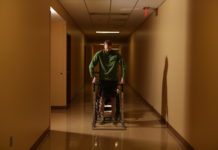Whether we “fall back” an hour in the Fall or “spring forward” an hour in the Spring, Jay McGuire, manager of the University of Louisville Physicians Sleep Center and a registered sleep technologist, has some tips for dealing with the change:
· When time changes hit in both the spring and fall, it’s important to remember the significant role exposure to light plays with regard to sleep. Do your best to increase exposure to natural light in the early morning hours, as this will help your body solidify a sleep cycle.
Don’t have a window in your office? Try a desktop Bright Light Therapy device. These lamps provide intense light (10,000 + lux) comparable to daylight for those who either start work before dawn, or aren’t able to let the sun shine in.
· Maintain your regular wake time! It will be difficult, but a regular wake schedule is one of the best things you can do to overcome bumps in the road like losing an hour of sleep here or there.
· Avoid caffeine and nicotine in the late afternoon and evening.
· Continue your regular exercise routine.
· Don’t sweat it! Anxiety about changing sleep schedules can itself cause insomnia. Your body knows what to do, so if you find yourself having issues with worry about sleep, try to focus on relaxing and letting the “ZZZZs” take care of themselves.
McGuire said most people won’t need to adjust their sleep schedule in advance and will be able to deal with the change just fine. But those who are particularly susceptible to time changes could try adjusting their sleep schedule in increments leading up to the change – for example, going to bed or waking up 10 minutes earlier each day.
Tips to rest easy
If you’re still having trouble sleeping, McGuire said there are some things you can do to improve your sleep. Part of the issue is that people simply don’t sleep enough.
“We are chronically sleep deprived as a society,” he said. “Most people get six hours or less. We really need seven and a half to eight hours a night.”
Here’s how to get your best sleep:
· Get regular exercise. “For it to be beneficial, you really need it three times a week,” he said. “It’s doesn’t even have to be the gym. Just some regular activity.” Just remember to avoid vigorous exercise within four hours of bedtime.
· Consolidate your sleep. Avoid sleeping a few hours here, or a few hours there. “Once you go to sleep, you need to stay asleep, and go through the appropriate cycles.” Keep a regular sleep cycle, even on weekends and holidays. Avoid naps and get at least 7.5-8 hours of sleep a night.
· Avoid alcohol, caffeine and nicotine four to six hours before bed. “Even if you sleep, it won’t be as deep as it should be because you have a stimulant in your system.”
· Practice “sleep hygiene.” Sleep hygiene refers to the sleeping environment, pre-bedtime behavior and medications. McGuire said most people don’t pay enough attention to their sleep environment. Among the things to consider:
Ensure your mattress is comfortable. “There are no specifics on how hard or how soft, just whatever is comfortable for you.”
Keep your bedroom dark, quiet and free of distractions. Your sleeping area should be free of electronic interference, and that means no TV, cell phones, computers or work materials. “If you watch TV before bed, you might get interested in something, and before you know it you’re watching a whole show.” The key is to avoid anything stimulating before bedtime.
Keep the bedroom temperature cool. A “comfortably cool” temperature is best. “Most people have trouble sleeping if it’s too warm,” he said. “A cooler environment is more conducive to a good night’s sleep, as is a quiet and dark environment.”
Avoid sleeping medications. Don’t use medications as a crutch for bad sleep behaviors, McGuire advised. “Some people may need them temporarily, but then it becomes a habit to help them get to sleep. We as a society like a quick fix. And once you develop bad sleep habits, they become hard to break. Also, you might sleep, but it doesn’t really address the problem that’s keeping you awake in the first place.”
Practice a consistent bedtime ritual. Follow a specific bedtime ritual that signals to your body it’s time for bed. Brush your teeth and wash your face, for example. Eliminate activities such as doing work or playing games on your phone, which tend to be stimulating. Find a relaxing bedtime routine, such as taking a warm bath or reading.
Know how eating before bedtime affects you. The old advice not to eat before bedtime isn’t really accurate, McGuire said. “Eating is OK, unless it’s a big meal, which might cause acid reflux when you lay down. Eating a small meal is OK, and can even help you get to sleep by alleviating your hunger and making you more comfortable. It all depends on how it affects you. Eating really doesn’t affect the quality of sleep.”
For workers with irregular hours
For those who work irregular hours such as nights or overnights, McGuire said it is best to stay on a permanent schedule if possible, rather than changing sleeping hours to accommodate personal activities or sleeping only when tired. Shift workers especially should focus on sleep hygiene, with a quiet, dark environment for daytime sleeping. Incorporating white noise, such as a fan, to drown out background noise can help, McGuire said. It’s also important to try to keep a work environment that is conducive to staying alert, with good lighting and a cool temperature.
“If you do all of this, and you still have issues, you may have a sleep problem, and that’s when it’s time to call us at the Sleep Center,” McGuire said.
About the UofL Physicians Sleep Center
The University of Louisville Physicians Sleep Center offers specialty diagnostic and treatment services that can to help you return to a normal, productive lifestyle. The Sleep Center, a division of our Sleep Medicine practice, is a state-of-the-art sleep lab set in a private, comfortable room that simulates a home setting, encouraging restful sleep. It is fully accredited by the American Academy of Sleep Medicine.
Our team of experienced, knowledgeable professionals work together to evaluate your situation and develop a treatment plan best suited for you. Our team of medical professionals includes pulmonologists, neurologists, psychologists, certified sleep technicians and nurses. We offer full diagnostic and evaluative sleep services, while collaborating closely with referring physicians to design treatment plans addressing a wide variety of sleep complaints and disorders.
About University of Louisville Physicians
University of Louisville Physicians is the largest multispecialty physician practice in the Louisville region, with nearly 600 primary care and specialty physicians in more than 78 specialties and subspecialties. Our doctors are the professors and researchers of the University of Louisville School of Medicine, teaching tomorrow’s physicians and leading research into medical advancements. Learn more at www.uoflphysicians.com.

























